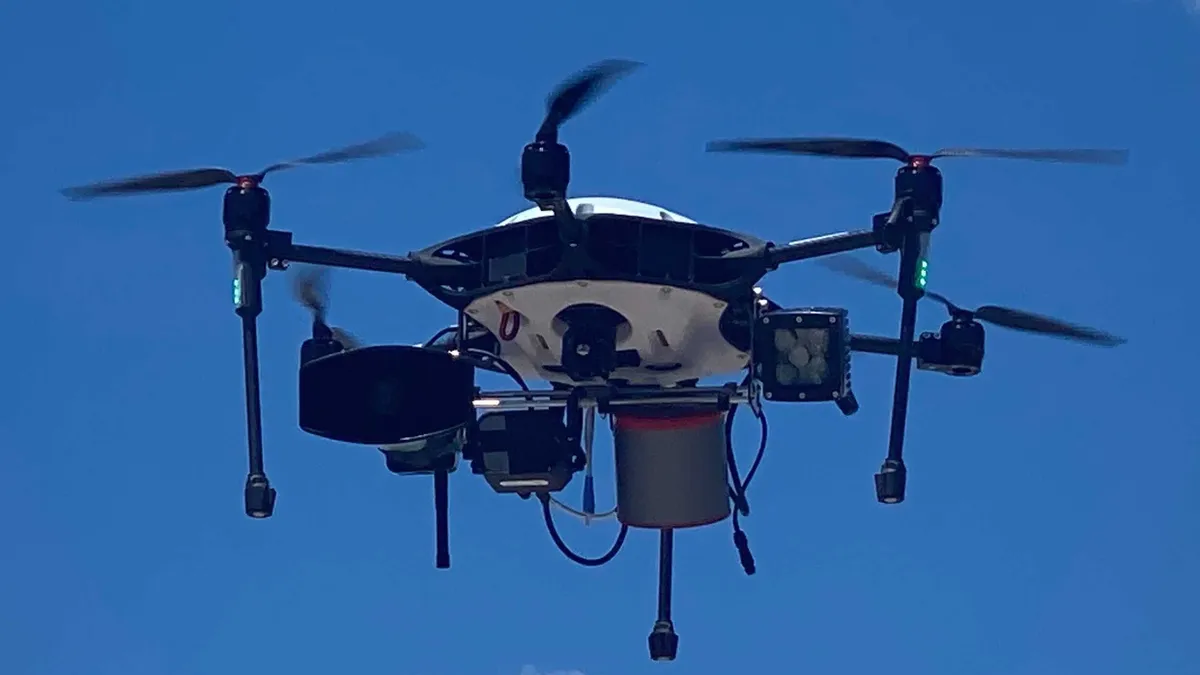Dive Brief:
- The city of Coral Gables, Florida, this month launched a program that deploys drones to monitor large crowds and quickly responds to 911 emergency calls before first responders are able to arrive. The city tested the program during its Fourth of July celebration, according to local news reports. The city did not respond to requests for comment by press time.
- During an emergency call, security services company Bond deploys a drone to the scene to quickly assess the situation — be it a fire or potential criminal activity, for example — and help intervene or identify suspects if needed, Bond Founder and CEO Doron Kempel told Smart Cities Dive.
- Bond’s Air Guardian drone is “faster, safer, least intrusive and more economical than any other way to get to the scene of action,” responding to a call within a 12-square-mile radius within two to three minutes, according to Kempel.
Dive Insight:
Police departments across the country have adopted drones to assist with surveillance, identify suspects, and follow the movement of cars and pedestrians at major events. Police use of drones has also prompted privacy and rights concerns. Digital rights nonprofit Electronic Frontier Foundation warns that police drones have the potential for invasive use, and has accused departments of chilling free speech and political expression by deploying them over protests.
Bond’s Air Guardian drones are unique because they’re deployed by company operators located in the city where the technology is used, said Kempel. They can be deployed faster than in-house police drones and are intended to protect privacy, he said.
During large events such as Fourth of July celebrations or sports events the drones can be used to monitor the immediate perimeter for dangerous activity such as an active shooter on the roof of a building, said Kempel. In that scenario, a drone could help police identify and track a suspect or, if needed, fly into a shooter’s face and stay on them “like a tick” as they flee the scene. But Kempel emphasized that the drones are solely monitoring the immediate perimeter — not looking at people’s barbecues or capturing events in the distance.
The technology can also be used to assess a car accident, fire or natural disaster before first responders are able to arrive. And the drones can respond to potential criminal activity in progress, giving police officers an image of the suspect before they arrive and knowledge of where they are. Further, the drone can double as a megaphone to direct people during emergency situations. During those emergency responses, the technology is not being used for general surveillance purposes, he said.
“We can basically put eyes and ears on anything in the city of Coral Gables within two to three minutes and give that information to officers on the street before they even get there,” Ed Hudak, the city’s police chief, told news station WPLG Local 10.
“This is an amazing technology,” Steven Meiner, a Miami Beach commissioner who is looking to bring it to his Florida city as well, said in an earlier interview.
Kempel said many U.S. cities need only a single drone to service the city, costing upwards of $50,000 per month for 24/7 service, which he said may be less than training an officer to operate a drone. Kempel said the company is also working with other cities, but would not specify which ones.












